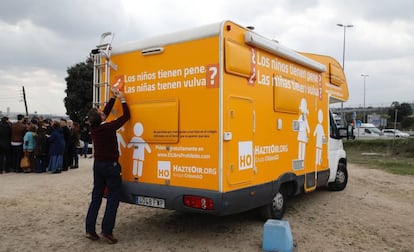Spain’s ‘transphobic bus’ rolls on to the streets of Manhattan
Banned at home, ultraconservative group internationalizes its anti-transgender campaign
A controversial campaign organized by Spain’s ultraconservative Catholic group Hazte Oír (Make Yourself Heard) has now been taken to the streets of New York where it is testing the tolerance of what is arguably the most liberal city in the United States.

“Here we are, Chelsea Clinton,” said campaign organizers after the daughter of Bill and Hillary Clinton tweeted: “Please don’t bring these buses to the U.S. (or anywhere).”
The original message spelled out on a bright orange bus in Madrid in early March read: “Boys have penises. Girls have vulvas. Don’t let them fool you. If you were born a man, you’re a man. If you’re a woman, you will continue to be one.”
Please don't bring these buses to the U.S. (or anywhere). https://t.co/WEvIIptmxf
— Chelsea Clinton (@ChelseaClinton) March 1, 2017
Hazte Oír is portraying its campaign as a freedom of speech issue. But it has been widely viewed as a response to an earlier awareness drive by a support group for transgender children. This group had run advertisements in bus shelters and metro stations in northern Spain with the slogan “There are girls with penises and boys with vulvas.” An anonymous New York donor funded that campaign.
The Hazte Oír bus was immediately impounded by authorities in Madrid. The group returned with a motor home and a slightly altered message: “Do boys have penises? Do girls have vulvas?” after a Madrid judge said that the bus would not be allowed on the city’s streets as long as it continued to bear the original wording, which might constitute hate speech.
Later still, another bus was commissioned to tour other Spanish cities. In Pamplona, on March 21, protesters hurled stones and eggs at the passing vehicle. One of the demonstrators was reportedly injured as she attempted to stop the bus.

On Wednesday of this week, a similar vehicle was seen on a street leading to the United Nations headquarters in Manhattan. The bright orange bus also passed in front of Trump Tower, through Times Square, Columbus Circle and near the Rockefeller Center.
But the English-language message also omits the words “penis” and vulva.”
“It’s biology. Boys are boys...and always will be. Girls are girls...and always will be. You can’t change sex. Respect all. Sign now to defend Freedom of Speech,” reads the text on the side of the bus.
The initiative is backed by CitizenGO, the larger group that Hazte Oír belongs to, as well as by the International Organization for the Family and the National Organization for Marriage, which is known in the US for its anti-LGBT campaigns. Its president, Brian Brown, has said that “gender cannot be changed based on emotions and feelings.”
But the message has already encountered opposition by local groups, which are calling it the Hate Bus.
Free speech is a constitutional right, but language has consequences that must be considered
Jessica Stern, OutRight Action
“Free speech is a constitutional right, but language has consequences that must be considered. Trans-youth already have an extremely high risk for violence, discrimination, and suicide. Broadcasting a message that erases and denies the reality that transgender and intersex children and youth exist is irresponsible, factually misleading, disrespectful, and dangerous. This vehicle is part of the reason trans youth are driven to suicide,” said Jessica Stern of OutRight Action International, a human rights group, on its website.
Now Hazte Oír, which is headed by Spaniard Ignacio Arsuaga, wants to take the bus to Boston, Philadelphia and Washington DC.
English version by Susana Urra.
Tu suscripción se está usando en otro dispositivo
¿Quieres añadir otro usuario a tu suscripción?
Si continúas leyendo en este dispositivo, no se podrá leer en el otro.
FlechaTu suscripción se está usando en otro dispositivo y solo puedes acceder a EL PAÍS desde un dispositivo a la vez.
Si quieres compartir tu cuenta, cambia tu suscripción a la modalidad Premium, así podrás añadir otro usuario. Cada uno accederá con su propia cuenta de email, lo que os permitirá personalizar vuestra experiencia en EL PAÍS.
¿Tienes una suscripción de empresa? Accede aquí para contratar más cuentas.
En el caso de no saber quién está usando tu cuenta, te recomendamos cambiar tu contraseña aquí.
Si decides continuar compartiendo tu cuenta, este mensaje se mostrará en tu dispositivo y en el de la otra persona que está usando tu cuenta de forma indefinida, afectando a tu experiencia de lectura. Puedes consultar aquí los términos y condiciones de la suscripción digital.








































